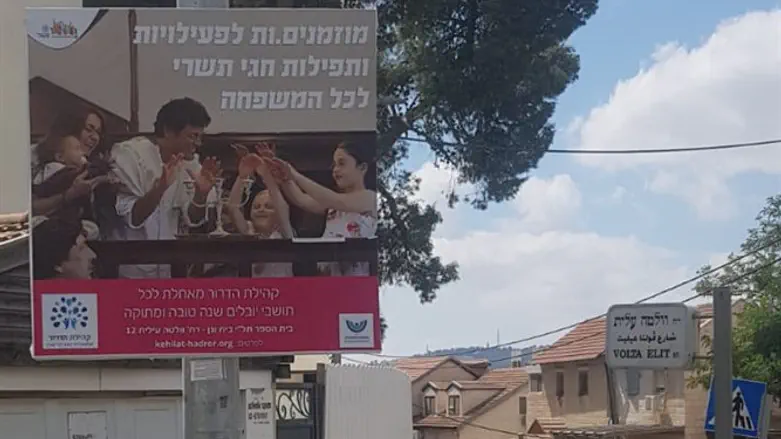
First publication: The Jerusalem municipality has ordered the “Dror” Reform community to remove billboards it posted in the Kiryat Yovel neighborhood in advance of Rosh Hashanah, calling on local residents to join Dror in “activities and prayers for the whole family during the month of Tishrei.”
Kiryat Yovel has long been a flashpoint of tension between secular and religious residents, with secular residents seeking to prevent the influx of religious families priced out of nearby haredi neighborhoods.
The deputy mayor of Jerusalem, Aryeh King, already protested the hanging of the billboards last week, noting that the signs sport the logo of the municipality even though the hanging of the signs was unauthorized.
“I ask forgiveness from G-d that I did not succeed in removing this breach of the sanctity of Israel under the auspices of the Jerusalem municipality,” he wrote on his Facebook page. “I also ask forgiveness of all the Jews who visit Jerusalem for these billboards that link the Jerusalem municipality with Reform organizations who attempt to distort the pure Torah of G-d.”
Despite the order, however, Arutz Sheva has learned that the billboards have not been removed and the issue is now being referred to the municipality’s enforcement department. The Dror community, however, has told Arutz Sheva that despite the order to remove the billboards, “We were told by senior figures in the municipality that the matter has yet to be resolved.”
The question of who, if anyone, originally authorized the hanging of the signs is also a matter of dispute. The municipality insists that no one authorized the signs, and given that the head of the relevant department for granting such authorizations is none other than Aryeh King himself, there is reason to believe the assertion. However, the Reform organization still maintains that someone within King’s department did grant them authorization to hang the billboards.
Responding to these claims, King insists that no one gave Dror a permit to hang the signs, and as proof, he points to a thread of email correspondence on the subject, including a letter to Dror from the municipality regarding their application for approval.
“We are very sorry that Mr. King, as deputy mayor, seems to be unfamiliar with the details of the law,” Dror responded. “The Dror community received all the relevant permits from the municipality and from the community council. All the members of our community condemn the ongoing incitement of Aryeh King, and suggest that the deputy mayor should cease to involve himself in such incitement during the Ten Days [of Repentance] as well as during the rest of the year… We have already seen what the results of such incitement can be in the form of the vandalism of the signs hung in Jerusalem on Rosh Hashanah.”
Arutz Sheva further investigated the matter and discovered that the Jerusalem municipality partially funds the Dror community in its neighborhood activities in Kiryat Yovel, and that at least one municipal official granted Dror the right to use the municipality’s logo on its publications due to this partial funding.
“The municipal logo appears on our publications because the municipality was ordered to permit this by the district court, due to the municipal funding we receive,” a Dror representative said. “The court ordered the municipality to support our festival events just as it supports and funds events held by the religious and haredi sectors in the city, via the cultural and heritage department.”
The Jerusalem municipality, however, denies Dror’s version of events, and states categorically that the municipal logo was printed on Dror’s billboards without permission, just as the billboards themselves were hung without permits.
